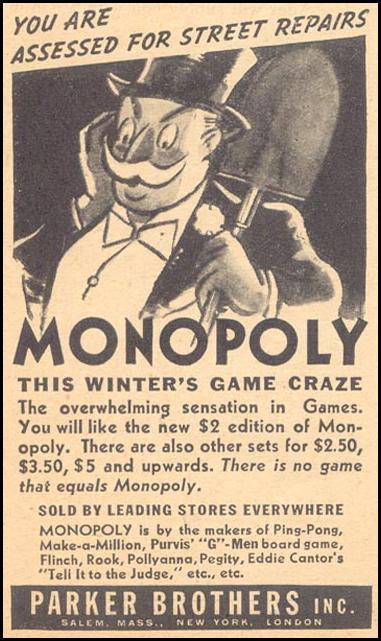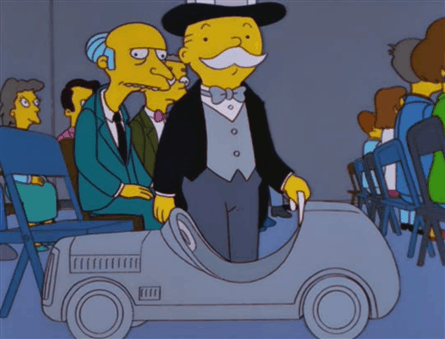Who did never play Monopoly? The board game ranks among the most famous worldwide and everybody has once or twice lost a friend or flipped the table over because of a raging defeat. One will store a fortune up while others will end up completely broke; most will be sent to jail and pay enormous taxes to the state. What turns people into playing such a realistic version of what society is about?

The ancestor of the Monopoly, The Landlords’ Game, was designed in 1903 by Elizabeth Maggie as a way to put her political beliefs forward: the game illustrates (very well) the fact that the rules of real estate, property and rent were not thought to make everybody equal, but rather for a few monopolists to take over common wealth.
Though it was first meant as an educational tool, it already entertained millions of people by the 1930’s and the game was exported to Europe where it had quite as much success. In Nazi Germany, however, the Monopoly was denounced because of its “Jewish speculative character” and sold way less. But this national preference would soon slip away; the Monopoly’s entry into numerous 1940’s households was just a detail when WW2 broke out. European wounds opened again, and most countries tore one another apart; war camps were established across Germany and they were home (sweat home) to a lot of Allied pilots captured on the enemies’ soil.

And it was war; but the Geneva Convention had tackled the POW status when it was ratified in 1929, and it still granted prisoners with rights – related to food, religious needs, medical treatments, and so on and so forth. One article of the convention specified that they could be delivered games to kill time: and why not play again that recent one which had gained general approval before WW2 was triggered off?
The initiative did not really come from the prisoners: rather from a man nicknamed ‘Clutty’. Christopher Clayton Hutton was a British pilot during WW1 who got hired by the MI9 – nope, not the very James Bond’s – in the wake of the conflict, partly because he had a knack for illusionists and magicians. And the British intelligence service was at the time looking for a way to smuggle POWs out of German war camps.
Hence, it comes as no surprise that Clutty came up with the idea of hiding various items designed to help Allied prisoners escape their cells into a board game; after all, he admired Houdini who had toured Europe covered in padlocks, and would break free every time… Hutton knew, by experience, there always was a way out.
He decided to produce a very special version of the Monopoly, to be sent as ‘entertainment material’ to Allied POWs. First, Clutty partnered with the game manufacturer, Waddingtons, which mastered the ability to print silk maps; then he and his team designed several other devices to be found only by their fellow soldiers. Among the regular metal tokens, a compass and a file would be added; German and French money would be concealed beneath Monopoly fake bills; eventually, the silk maps would be hidden within the board.

Following the design, carving of the regular boxes was undertaken, so as to make these items completely invisible: then only would the games be really turned into I-Want-To-Break-Free kits to be delivered to Allied POWs. Shipping was neither left to chance: the liberty parcels would bear fake charities or organizations’ names, along with encouragement and support notes so as not to raise any suspicion. One read for instance a specific Bible quote, which could draw prisoners’ attention to the parcel’s saving purpose, Clutty recalls: “Ask and it shall be given you; seek and ye shall find; knock and it shall be opened unto you” (Matthew 7:7). Careful attention to detail was required, overseen by Hutton’s team: organizations that were said to be Liverpool-based would wrap the packages’ contents with Liverpool newspapers. No mistake was allowed, since it only took one clue to reveal that the key of the prisoners’ salvation was included in those board games.
Then, some of them were sent to war camps, along with regular Monopoly games – would any suspicious version be discovered, and none could ever be handed to a POW, neither for entertaining nor for escaping purposes…
But this is one of the mere examples or wartime tricks that did actually work. The fake Monopoly boards were supposed to be destroyed upon using, which had two consequences: 1, Clutty’s project remained a secret until 1985 (!) and 2, not so much evidence is left to this day to estimate how many POWs did escape using the Monopoly sets. Overall, it is said that an amount ranging from a few hundreds to several thousands of soldiers made its way out thanks to Hutton and the MI9 team.

So, to conclude: all it took to get these prisoners out of war camps was a political activist who designed a real-estate-business-like game, a company to manufacture and promote it, a WW1 veteran, a worldwide-famous illusionist to draw inspiration from, and the Geneva Convention. Would any of these have lacked, perhaps the course of war would have changed, who knows? After all, even the smartest initiative can start by simply rolling the dice.
Sources:
- https://en.wikipedia.org/wiki/History_of_the_board_game_Monopoly
- https://www.theatlantic.com/technology/archive/2013/01/how-monopoly-games-helped-allied-pows-escape-during-world-war-ii/266996/
- http://mentalfloss.com/article/62285/how-brilliant-intelligence-officer-used-monopoly-free-wwii-pows
- https://en.wikipedia.org/wiki/Geneva_Convention_(1929)
- https://en.wikipedia.org/wiki/Christopher_Hutton

What is more important was the role of the Game of Monopoly during WW2 to the POWs in camps.
Late 1942 specially selected versions of the Game were distributed by a Fake company to the Red Cross to hide where they came from to keep the Red Cross out of the loop. They had a colour marker on top of the box i.e. for Prisoners of War in Stalag VB etc. Inside there was a map pertaining to the area they were imprisoned hidden in the game made of either Silk or Rayon as to not make noise when unravelled. Inside the small metal toys, one had a Compass and again depending upon where your were in my father’s case he had real 500 French Francs hidden in the Monopoly Money. German Stalag guards never checked the games boxs as they trusted the Red Cross and what could possibly be inside a small light game?
My father escaped Stalag VB in the middle of 1942 and went on to fight the enemy for years later on in Resistance Groups. He also became one of Polands top assassin. If you wish to read more on this Game in detail google the book ‘ To Live Well is to Hide Well ‘ or go to AMAZON.
LikeLike